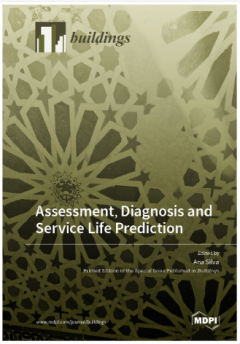Filter by

Analysis and Design of Structures Made of Plastically Anisotropic Materials
Abstract Plastic anisotropy is a common property of many metallic materials. This property affects the analysis and design of structures and metal forming processes. The present edited collection of papers concerns analytic and numerical methods of structural and metal forming analysis and design using material models for anisotropic materials. Some qualitative features of rigid plastic soluti…
- Edition
- -
- ISBN/ISSN
- 9783039368396
- Collation
- -
- Series Title
- -
- Call Number
- -

Analysis and design of multiple element antennas for urban communication
Abstract This work focuses on the analysis and design of multiple element antennas (MEA) and their interaction with the propagation channel. In particular, attention is given to urban channels and how its information throughput, i.e. capacity, can be improved. With this in mind, this work extends an existing network model of the communication system in order to reduce computation time, investi…
- Edition
- -
- ISBN/ISSN
- 9783866445130
- Collation
- -
- Series Title
- -
- Call Number
- -

Asset Pricing, Investment, and Trading Strategies
Asset pricing, investment, and trading strategies are very important in finance. They are useful in various situations, for example, supporting the decision-making process of choosing investments; determining the asset-specific required rate of return on the investment; pricing derivatives for trading or hedging; getting portfolios from fixed incomes or bonds, stocks, and other assets; evaluati…
- Edition
- 1
- ISBN/ISSN
- 9783036530840
- Collation
- -
- Series Title
- -
- Call Number
- -

Analysis and Design of Hybrid Energy Storage Systems
Abstract The most important environmental challenge today's society is facing is to reduce the effects of CO2 emissions and global warming. Such an ambitious challenge can only be achieved through a holistic approach, capable of tackling the problem from a multidisciplinary point of view. One of the core technologies called to play a critical role in this approach is the use of energy storage …
- Edition
- -
- ISBN/ISSN
- 9783039286874
- Collation
- -
- Series Title
- -
- Call Number
- -

Assessment of Socio-Economic Sustainability and Resilience after COVID-19
The pandemic period has caused severe socio-economic damage, but it is accompanied by environmental deterioration that can also affect economic opportunities and social equity. In the face of this double risk, future generations are ready to be resilient and make their contribution not only on the consumption side, but also through their inclusion in all companies by bringing green and circular…
- Edition
- 1
- ISBN/ISSN
- 9783036527215
- Collation
- -
- Series Title
- -
- Call Number
- -

Analysing Psychosocial and Contextual Factors Underpinning Bullying and Cyber…
Abstract This eBook is a collection of articles from a Frontiers Research Topic. Frontiers Research Topics are very popular trademarks of the Frontiers Journals Series: they are collections of at least ten articles, all centered on a particular subject. With their unique mix of varied contributions from Original Research to Review Articles, Frontiers Research Topics unify the most influential …
- Edition
- -
- ISBN/ISSN
- 9782889633449
- Collation
- -
- Series Title
- -
- Call Number
- -

Assessment Strategies for Online Learning: Engagement and Authenticity
For many learners assessment conjures up visions of red pens scrawling percentages in the top right-hand corner of exams and feelings of stress, inadequacy, and failure. Although negative student reactions to evaluation have been noted, assessment has provided educational institutions with important information about learning outcomes and the quality of education for many decades. But how accur…
- Edition
- 1
- ISBN/ISSN
- 9781771992329
- Collation
- -
- Series Title
- -
- Call Number
- -

Assessment, Diagnosis and Service Life Prediction
Service life prediction is crucial for the adoption of more sustainable solutions, allowing developers to optimize the costs and environmental impact of buildings during their life cycle. An accurate assessment of the service life of buildings requires a thorough understanding of the degradation mechanisms and behaviour of the construction materials. Building pathology assessment methods charac…
- Edition
- -
- ISBN/ISSN
- 9783036562353
- Collation
- -
- Series Title
- -
- Call Number
- -

Analysing Emotional Labor in the Service Industries: Consumer and Business Pe…
Abstract This eBook is a collection of articles from a Frontiers Research Topic. Frontiers Research Topics are very popular trademarks of the Frontiers Journals Series: they are collections of at least ten articles, all centered on a particular subject. With their unique mix of varied contributions from Original Research to Review Articles, Frontiers Research Topics unify the most influential …
- Edition
- -
- ISBN/ISSN
- 9782889632596
- Collation
- -
- Series Title
- -
- Call Number
- -

Analogy and Exemplary Reasoning in Legal Discourse
Abstract This book brings together contributions from leading figures in legal studies on analogy and related forms of reasoning in the law. Analogical reasoning-which relies on the concept of two different things being in some way like each other-is hugely important not just in the practice of law, but it is nonetheless strongly contested.
- Edition
- -
- ISBN/ISSN
- 9789462985902
- Collation
- -
- Series Title
- -
- Call Number
- -
 Computer Science, Information & General Works
Computer Science, Information & General Works  Philosophy & Psychology
Philosophy & Psychology  Religion
Religion  Social Sciences
Social Sciences  Language
Language  Pure Science
Pure Science  Applied Sciences
Applied Sciences  Art & Recreation
Art & Recreation  Literature
Literature  History & Geography
History & Geography